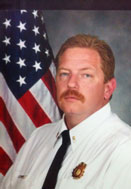
By Jeffrey Burleson
When you set out to find the best accountability system for your department, there are several factors you must consider.
- The size of your fire department
- Your budget constraints
- Whether the system meets National Fire Protection Association (NFPA) Standards 1500, Standard on Fire Department Occupational Safety and Health Program, and 1561, Standard on Emergency Services Incident Management System
- Your accountability policies
- The practicality of the system
- How your personnel will use it
There are many more factors to consider, but I want to address the personnel that will be using the accountability system.
WHAT IS HAPPENING
The idea of an effective accountability system seems easy, so why are so many departments failing miserably in this area? It should be as routine as tying our shoes or donning our self-contained breathing apparatus.
I am sure every department has an accountability system, so this is not the problem. The problem is following the established guidelines. Have we lost something in transitioning to the next generation of firefighters?
It seems we have lost the concept of accountability long before we arrive at an emergency scene. The lack of accountability starts way before an incident ever occurs. In this kinder more gentle fire service that we have fostered, the very people we expect to be accountable and follow orders on an emergency scene are the same ones that we try not to offend in the routine day-to-day operations. I am not saying we return to ways of the past, but if we want people to be accountable, it must start at the station level.
There is no longer a fear of repercussions of a half-hearted effort. If I gave a half-hearted effort when I was playing sports growing up, my coach would pull me aside, get my attention, and let me know his expectations were not being met. I was told to get my heart into it or I would be sitting on the bench. This may seem like a strange concept in today’s fire service.
CULTURE CHANGE
We must change the culture if we expect any accountability system to work, and we must change the way we approach accountability. There are more than 3 million hits when you search Google for “fire service accountability.” With all the information out there, one would think that we have the problem figured out. Millions and millions of dollars are spent every year trying to figure out better ways to make accountability work.
The best accountability system is the one that you make work. It can be as simple as the passport system or as elaborate as new GPS tracking devices. It all comes down to the ability of the incident commander to have the “old head” mentality. What is wrong with giving orders and expecting them to be followed? I believe this is what has been lost in the transition to the younger fire service.
Being accountable is nothing new. When I was a child, I was given rules and boundaries. I also knew when I broke a rule or was outside of the boundaries, there would be repercussions. My parents always wanted to know where I was, who I was with, and what I was doing. This established the rules, and I knew what was expected of me. That is exactly what makes up the best accountability system. If all of these are in place, you have the best system. Perhaps we need to start acting like our parents when dealing with accountability. Expect no less than perfection
GETING BACK ON TRACK
If we truly want to fix our broken accountability systems, then we must reflect back on our mentors from the past.
Our parents and coaches instilled some core values in us that we seem to have failed to pass on to the younger generation. It is no wonder that our accountability systems fail on the emergency scene when we don’t expect accountability any other time. The fire service is rich in history; let’s not fail to pass on the good things that we have learned. We must not forget that it is imperative to address these issues now and on a daily basis. The ones that we are going to hold accountable must know and understand our expectations. The ones you are teaching/mentoring today are the ones that will be teaching/mentoring your children and grandchildren in the fire service tomorrow. So starting today, we need to think more like our parents and coaches did.
There is nothing wrong with expecting perfection when it comes to accountability. It may very well save the life of one of your own children that follow you into the fire service. The best accountability system is the one that you make work!
 Jeffery W. Burleson is a veteran firefighter and a captain with the Center Point Fire District in Birmingham, Alabama.
Jeffery W. Burleson is a veteran firefighter and a captain with the Center Point Fire District in Birmingham, Alabama.

